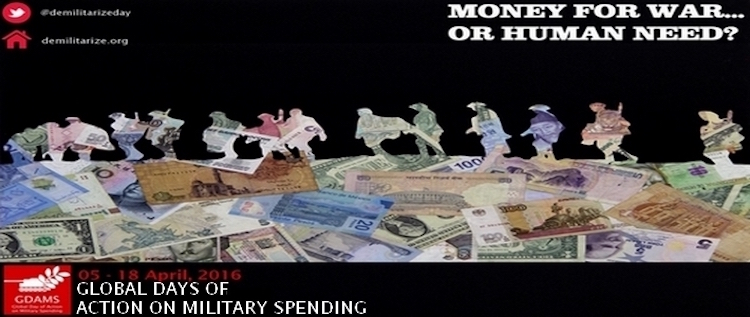
By Kimiaki Kawai
The author is Director, Peace and Human Rights, Soka Gakkai International (SGI). This is an abridged version of his presentation at a panel discussion ‘Not in the Name of Religion’ on the occasion of IPB World Congress 2016 on Military and Social Spending, at the Technical University in Berlin, on October 02, 2016.
BERLIN (IDN-INPS) – While “the use of violence is always a defeat for humanity”, there are still more than 15,000 nuclear warheads in the world, which continue to threaten our very existence. They are at the peak of a pyramid of violence as the most destructive of all our tools of war.
SGI rejects nuclear weapons as weapons of demonic cruelty, the manifestation of the most destructive aspects of the human heart. This was the basis for the call issued in 1957 by our organization’s second president, Josei Toda, in which he called for the complete elimination of nuclear weapons.
Moved and inspired by this declaration, the members of the SGI have engaged in wide-ranging activities, centered on grassroots dialogue, to foster global solidarity among ordinary citizens as the necessary foundation for a world without nuclear weapons.
SGI believes that at the “heart of the nuclear weapons issue is the radical negation of others” – the denial of their humanity and their equal right to happiness and life.
A potent recognition of the nature of nuclear weapons is the starting point for achieving the epochal transition to legal prohibition of such weapons whose negotiation is expected to happen in 2017.
In the same way, the grassroots solidarity grown through this undertaking will support and advance efforts for the resolution of the many other challenges facing humankind such as climate change and poverty.
In order to break the spiral (of violence), SGI stresses the importance of the following three points:
Fostering imaginative empathy
First, as a Buddhist faith-based organization (FBO) upholding the value and dignity of life, SGI believes that the challenge of nuclear weapons abolition can only be met through a sustained effort to expand our individual and shared capacities for imaginative empathy.
In the Buddha’s teachings we find these words: “All tremble at violence; life is dear to all. Putting oneself in the place of another, one should not kill nor cause another to kill.”
There is a universal impulse to avoid suffering and harm. We all have an intuitive sense of the unique value of our own existence. To the degree that we can realize that others must feel the same way, we can sense the reality of their fears, concerns and aspirations.
Such empathy enhances the possibilities of dialogue, whether between individuals or states. And dialogue is the most certain path to realizing our shared quest for the authentic experience of security, human security for all.
Conflict of views does not make dialogue impossible, it rather makes it necessary.
Empowering people
A widespread sense of hopelessness or powerlessness can seriously impede development of shared strategies and action among people at the grassroots.
Finding ways of transforming such feelings is essential if we are to generate a global popular groundswell for a world free from nuclear weapons.
SGI’s nuclear abolition efforts aspire to provide people with accurate information about present realities.
At the same time, they always seek to encourage reflection and empower people with the confidence that they can indeed be agents for positive change.
SGI President Daisaku Ikeda says: “Rather than the spurs and promptings of fear, we best negotiate the challenges we face when guided by a vision of hope.”
Engaging youth
Because they come from a moral perspective, FBOs are uniquely positioned to address the core of this issue – the inhumane nature of nuclear weapons—and to bring together people’s voices, energy and imagination to work for their elimination.
Young people must be a key constituency in this, and our efforts have had a special focus on youth.
Last year (2015), SGI partnered with the International Campaign to Abolish Nuclear Weapons (ICAN), Mines Action Canada (MAC), Nuclear Age Peace Foundation and others to organize an International Youth Summit for Nuclear Abolition in Hiroshima, an event that brought together 30 leading youth activists for nuclear disarmament from more than 20 countries.
These young leaders continue to communicate and collaborate, rooting a sustained sense of empowerment and commitment in the rising generations.
Global Citizenship Education
Since SGI has been contemplating these points, education comes as the first approach when tackling the issue.
When people lose sight of a sense of interrelatedness, they do not see that destroying others means destroying themselves.
In the context of security, such thinking is based on the delusion that we can protect our own self-interest and build our own security by terrorizing and sacrificing others.
SGI is engaged in grassroots activities to raise public awareness in this regard. A firm spiritual foundation is the key to constructing an enduring culture of peace.
Education is not something distant from us; our schools, our homes and our communities provide myriad opportunities for strengthening our shared capacity for learning and teaching.
SGI believes that profound transformation within individuals – an awakening to the preciousness of our own lives, the lives of others, and to the indissoluble linkages between our own lives and those of others – can provide the basis for popular solidarity opposing nuclear weapons.
Human beings have the great potentials within to create value even in a very difficult situations and environments.
Human security for all
SGI believes that the work of building authentic security, human security for all, must be a truly “global enterprise” involving all States and fully engaging civil society.
This also means that the key to abolishing nuclear weapons lies in mobilizing a diverse range of actors toward our shared goal. Here, civil society, FBOs in particular, can make significant contributions.
In his 2009 proposal, SGI President Ikeda stated: “If nuclear weapons epitomize the forces that would divide and destroy the world, they can only be overcome by the solidarity of ordinary citizens, which transforms hope into the energy to create a new era.”
Conclusion
As we confront the daunting challenges before us, we are also standing at an important juncture in history.
The members of the SGI worldwide will continue to work to expand citizen’s solidarity toward a world of peace and coexistence to contribute to making it a global enterprise. [International Press Syndicate – 02 October 2016]
Image; IPB

